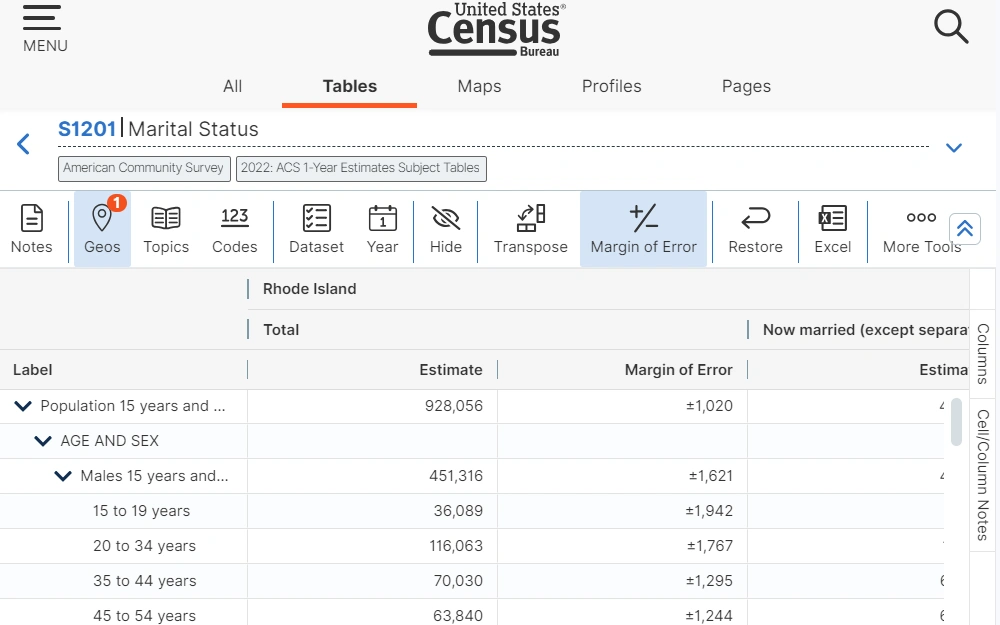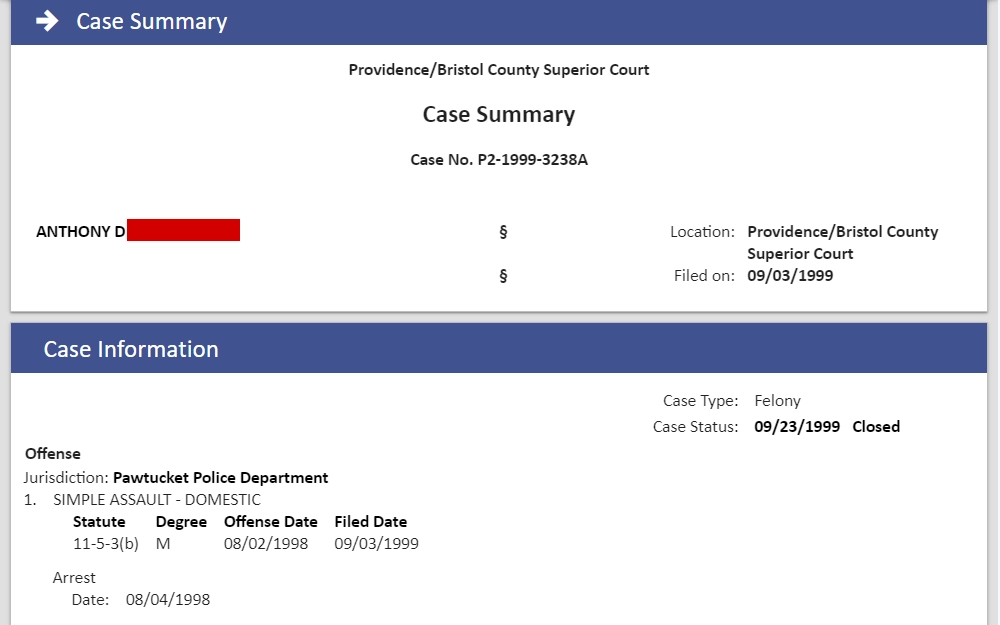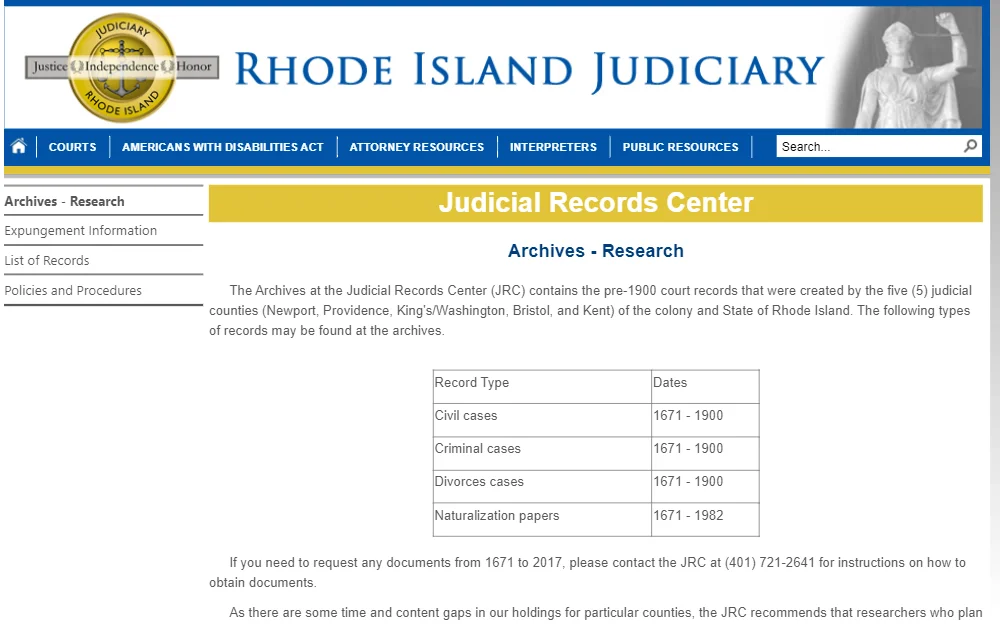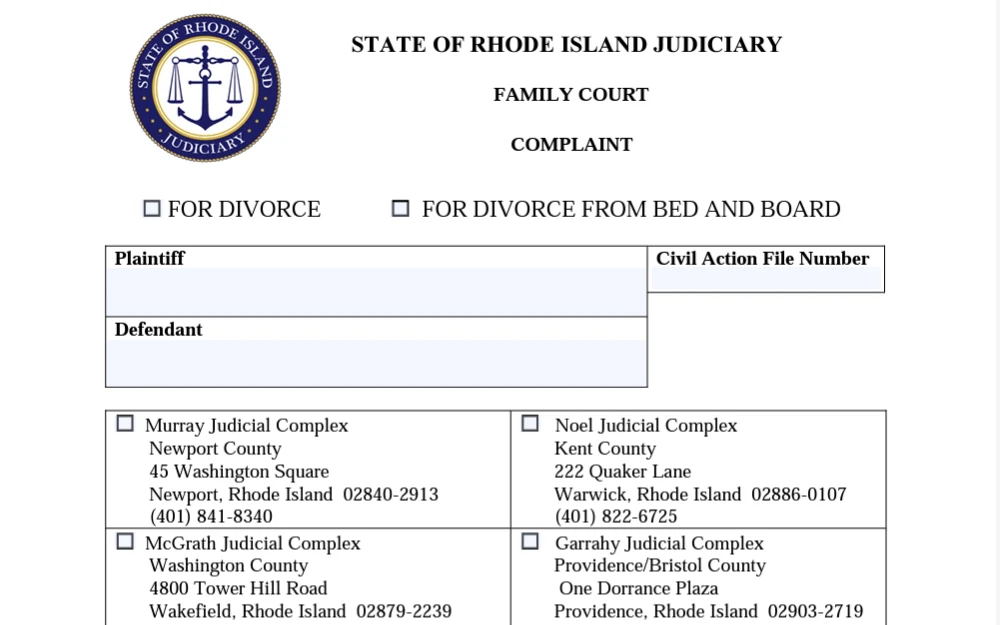Track down free Rhode Island divorce records quickly and without hassle via the guidance offered in this resource.
As the smallest state in the continental United States, Rhode Island provides divorce records at both state and county levels.
Moreover, information from dissolution cases may be found for free by checking online databases.
This resource will help anyone interested in searching divorce records in Rhode Island by streamlining the search process; learn how to obtain divorce records through the steps outlined below.
Are Divorce Records in Rhode Island Publicly Available?
As a general matter under Rhode Island Law, records maintained by a government body are public, and every person has a right to inspect and copy the records. Rhode Island distinguishes vital records by placing safeguards around the integrity of vital records.
On its face, the Rhode Island vital records law prohibits any person from inspection or disclosure of vital records prior to the record being determined to be a public record.1 The exceptions being:
- Attorneys
- Title examiners
- Persons with a personal or property right
- Person granted a court order
- Person with legitimate direct interest
- Other persons and agencies given approval pursuant to law
However, information contained in vital records for research purposes may be disclosed. Also, because divorce records are defined as vital records, anyone can review information contained in a divorce decree.
Although the law is clear on this, there may be situations in which a public body may deny your right to review divorce record information.
If your request is denied, the vital records law states you should petition the administration of that agency. If the chief administrative officer determines the record is still not subject to public inspection, you should file a formal complaint with the Rhode Island Attorney General.2
To submit a complaint, send a brief statement that includes all relevant information and documentation via email or mail to:
Rhode Island Attorney General’s Office
Open Government Unit
150 S. Main St.
Providence, Rhode Island 02903
Email: [email protected]
For more information concerning public access to divorce records in Rhode Island, contact the state Attorney General’s Office at 401.274.4400.
Lastly, the United States Census Bureau provides updated Rhode Island divorce rates. According to a 2022 survey, 22% of the Rhode Island adult population is divorced.

How To Find Rhode Island Divorce Records at No Cost
Interested parties seeking to conduct a free public divorce records search should understand that the Family Courts in Rhode Island are the records custodians.4
Family Courts are part of the Rhode Island Judiciary, the judicial branch of the state government responsible for operating and maintaining the state court system.5
The Rhode Island Judiciary provides online divorce records for free. Researchers only need to know the first and last name of an individual they want to research. When using the public portal search function, users must input the last name followed by a comma and then the first name.

Once results are generated, the database will display all Rhode Island court cases that involve a person with the name of the individual inputted in the search. This includes criminal and civil cases, in addition to family court cases. There is no advanced search or filtering device to specifically locate divorce records only.
To find divorce records, users must search for cases heard by a Family Court. The name of the court will be found under the “Location” column.
When a researcher finds a court case that originated out of a Rhode Island Family Court, they must click on the case number to see what type of case was heard by the Court. Although there is a “Case Type” space in the case information section, a divorce case still may not be explicitly stated.
The case type could say “Miscellaneous Complaint” but be a divorce case. The most accurate way to determine if a case is a divorce case is to locate the case events section. If the case is a divorce case, one of the events will clearly state “Complaint for Divorce Filed.”
Case events are listed in chronological order, and anyone can see what happened in the case, including:
- Grounds for divorce
- Proof of service
- Continuance requests
- Motions filed
- Orders entered
- Decisions
- Final judgements
This database does not provide information on specific facts discussed in the case or specific results of the final judgments. It only informs of the type of court hearings and documents filed and submitted with the court.
The Rhode Island Department of Health allows members of the public to order vital records.7 Their online method of ordering vital records is through VitalChek. Use the platform to order a divorce certificate.
Checking With Counties & Cities in Rhode Island for Divorce Records
Unlike most states in the United States, Rhode Island does not have county governments. Therefore, they do not have their own independent county court system. All Family Courts that have jurisdiction over divorce cases are maintained by the State Judiciary.
However, there are four Family Courts located in different counties – Newport, Kent, Washington, Providence/Bristol.
| Court | Address | Phone |
| Kent County Family Court | Noel Judicial Complex 222 Quaker Ln. Warwick, Rhode Island 02886 |
401.822.6725 |
| Newport County Family Court | Murray Judicial Complex 45 Washington Sq. Newport, Rhode Island 02840 |
401.841.8340 |
| Providence/Bristol County Family Court | Garrahy Judicial Complex One Dorrance Plaza Providence, RI 02903 |
401.458.3200 |
| Washington County Family Court | McGrath Judicial Complex Tower Hill Rd., 4800 Wakefield, RI 02879 |
401.782.4111 |
The courts do not offer a method for ordering divorce records online, nor do they provide instructions on how to obtain the records. Interested parties may contact the Clerk or Court Administrator in the respective county where the divorce took place in order to obtain divorce records.
- Providence County Court Administrator – 401.458.5300
- Kent County Clerk’s Office – 401.822.6725
- Washington County Clerk’s Office – 401.782.4111
- Newport County Clerk’s Office – 401.841.8340
Additionally, divorce records information can be found for genealogy purposes. See the section below to learn how to locate archived historical divorce records.
Searching Free Rhode Island State Divorce Archives for Genealogy & Lineage Research
The Judicial Records Center of the Rhode Island Judiciary contains archived court documents from 1671 – 1900. These records include divorce, criminal, civil, and naturalization papers.

The Judicial Records Center does not offer the public a divorce index that may be searched online. They do provide a policy and procedures document that details how to obtain archived divorce records.
Individuals looking to obtain older divorce records may make requests in person or through the mail at the Judicial Records Center.
Rhode Island Supreme Court
Judicial Records Center
5 Hill St.
Pawtucket, RI 02860
There are specific materials needed for final judgment documents to be released:
- Court Name
- Case Number
- Telephone Number
- Certified Check or Money Order for $25
- Self Addressed Stamped Envelope
It is advised that any researcher looking for archived divorce records to contact the Judicial Records Center at 401.721.2641 in advance of any order request or visit to verify the availability of the document.
Common Law Marriages & Divorces in Rhode Island
A common law marriage is one that does not depend for its validity on any official or state-sponsored ceremony but is rather created by consent between two parties. It is common law because its practice has not been codified into the official laws of Rhode Island but has instead been adopted by the decision of various cases within the state.
There are several cases that highlight the rules that govern common law marriages. In one common law court case, a wife was seeking a divorce from her husband; however, they were never officially married. She claimed they were, and he claimed they were not.
The court used a fact-intensive inquiry test to determine the existence of a common law marriage that still has authority today:
- The parties’ capacity to marry
- The parties’ serious intention to enter into a mutual marriage relationship
- The parties’ conduct leads the community to believe they are married
Parties seeking to prove a common law marriage must provide enough evidence to satisfy each of the three factors. For example, parties must not be married to another person and must be of age to marry. The parties must cohabitate, typically for several years.
Other facts, like children in common, wearing wedding rings and bands, and having joint bank accounts, may demonstrate the existence of a common law marriage.
However, it is ultimately up to a court to determine if a common law marriage exists. Generally, this issue will only arise in situations involving an annulment or divorce. It is not easy to prove a common law marriage, but that’s what an individual must do if they want a divorce, and particularly if they are seeking alimony.
For more information concerning common law marriages or the process of ending this type of partnership, contact the Rhode Island Clerk of the Supreme Court at 401.222.3272.9 They can help you locate case law that describes the rules surrounding common law marriages in Rhode Island.
How To Search for Dissolution of Marriages & Common Law Divorce in Rhode Island
Before seeking a common law divorce, a person must first prove that a marriage existed. The factors above are what courts in Rhode Island consider when determining if a common law marriage exists.
Those interested in getting a divorce should file for it with one of the Rhode Island Family Courts. As explained earlier, the Court will make whoever files for divorce to first prove that a marriage existed. If the plaintiff is able to prove that a common law marriage existed, they will then be able to continue to divorce proceedings.
While how to track down divorce records throughout the state has been covered above, citizens can actually learn how to get a divorce in Rhode Island in the section below.
How To File for a Divorce & Respond to Petitions (Rhode Island Divorce Process)
Anyone seeking a divorce in Rhode Island must first satisfy the residency requirement. To file for divorce in Rhode Island, the plaintiff, or the person filing, must have been a resident of the state for one year or more.
The plaintiff must then determine what the grounds for the divorce are. People get divorced for several reasons, and Rhode Island provides the legal grounds for divorce in their laws.
- Irreconcilable differences or no-fault divorce
- Separation (3 years)
- Impotency
- Adultery
- Extreme cruelty
- Desertion
- Drunkenness
- Drug use
- Neglect
- Gross misbehavior
The plaintiff must then file for divorce using the complaint form in the county where the spouse lives. The form requires the plaintiff to fill out their name, and the defendant or other spouse’s name, check which Family Court should hear the case, and provide the general grounds for divorce. The form must also be notarized, and the fee for filing is $160.

Once the divorce papers are filed, the plaintiff must serve the spouse, generally by using the Rhode Island Sheriff’s Office.11 This service is $45 if the other spouse lives in Rhode Island.
The defendant will then have the opportunity to respond to the divorce complaint. The parties are not required to go through arbitration prior to the first court date. However, the parties may attempt to discuss whether the divorce will be contested or uncontested.
If the divorce is uncontested, the spouses would generally agree to no-fault by either party and resolve all financial issues before the final judgment is entered.
If the divorce is contested, there will be a trial, where each party will present their case, and the judge will determine who’s at fault. Afterward, the court will determine how to divide the financial assets and properties acquired during the marriage, as well as custody and alimony.
Alimony is payments for the support of a spouse in the event of a divorce. Alimony in Rhode Island is determined by a number of factors, including:
- Length of marriage
- Conduct of parties during the marriage
- Health, age, occupation, and income of the parties
- Liabilities and needs of parties
- Parties inability to support themselves
The division of property is determined by the same factors above but also includes:
- The opportunity of each party to acquire future capital and income
- The contribution by each party to the increased earning power, education, business, licensure, and training of the other
- The need of the custodial parent to own or occupy the marital residence as it may be in the best interest of the child
- Either party’s waste of assets made in contemplation of divorce
- Any other factor the court finds to be just and proper
Every matrimony or nuptial doesn’t end how it started. It’s important to understand how to get a divorce and look up records. By following the guidance offered in this resource, you will discover how to obtain Rhode Island divorce records efficiently and seamlessly; if you’re seeking additional information on individuals throughout the state, refer to the RI free public record search steps.
References
1Rules and Regulations Governing Vital Records. Rhode Island Department of State. (n.d.) Retrieved November 9, 2023, from <https://rules.sos.ri.gov/regulations/part/216-10-10-1#:~:text=for%20Vital%20Records-,Pursuant%20to%20R.I.,in%20accordance%20with%20these%20Regulations>
2Open Government. Rhode Island Attorney General. (2023) Retrieved November 9, 2023, from <https://riag.ri.gov/about-our-office/divisions-and-units/civil-division/government-litigation/open-government>
3Marital Status. United States Census Bureau. (n.d.) Retrieved November 9, 2023, from <https://data.census.gov/table/ACSST1Y2022.S1201?g=040XX00US44>
4Virtual Clerk’s Office. Rhode Island Judiciary. (2014) Retrieved November 9, 2023, from <https://www.courts.ri.gov/Courts/FamilyCourt/Pages/Virtual.aspx>
5Self-help Center. Rhode Island Judiciary. (2014) Retrieved November 9, 2023, from <https://www.courts.ri.gov/Pages/default.aspx>
6Case Summary. Rhode Island Judiciary Public Portal. (n.d.) Retrieved November 9, 2023, from <https://publicportal.courts.ri.gov/app/RegisterOfActions/#/CCE0625BB3EA2A2DB79A029959E7BE8CB8758EF5867E1F689FD39D786A296BA5/anon/portalembed>
7Birth, Death & Marriage Records. Rhode Island Department of Health. (2023) Retrieved November 9, 2023, from <https://health.ri.gov/records/>
8Archives – Research. Rhode Island Judiciary. (2014) Retrieved November 9, 2023, from <https://www.courts.ri.gov/JudicialRecordsCenter/Pages/Research%20in%20The%20Archives.aspx>
9Contact Information. Rhode Island Judiciary. (2014) Retrieved November 9, 2023, from <https://www.courts.ri.gov/Courts/SupremeCourt/Pages/SupremeCourtContactInformation.aspx>
10Complaint. Rhode Island Judiciary. (2023) Retrieved November 9, 2023, from <https://www.courts.ri.gov/PublicResources/forms/Family%20Court%20Forms/Complaint%20for%20Divorce%20or%20Divorce%20From%20Bed%20and%20Board.pdf>
11Services, Location, & Contact Us. Rhode Island Sheriffs. (2023) Retrieved November 9, 2023, from <https://sheriffs.ri.gov/services-location-contact-us>
